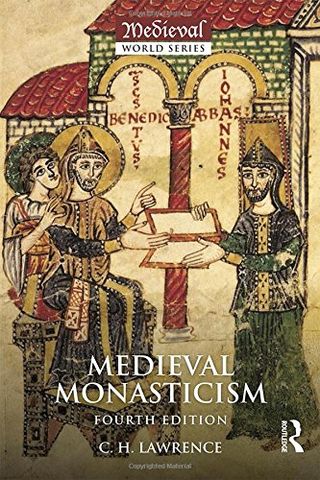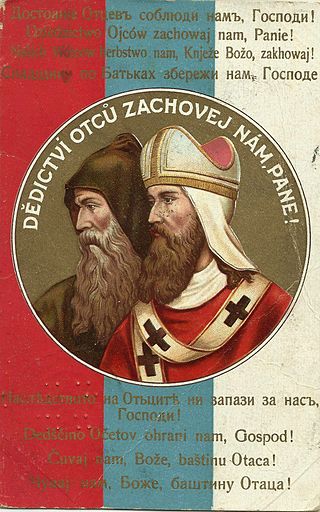Related Research Articles

Hindus are people who religiously adhere to Hinduism, also known by its endonym Sanātana Dharma. Historically, the term has also been used as a geographical, cultural, and later religious identifier for people living in the Indian subcontinent.

The history of Christianity begins with the ministry of Jesus, a Jewish teacher and healer who was crucified and died c. AD 30–33 in Jerusalem in the Roman province of Judea. Afterwards, his followers, a set of apocalyptic Jews, proclaimed him risen from the dead. Christianity began as a Jewish sect and remained so for centuries in some locations, diverging gradually from Judaism over doctrinal, social and historical differences. In spite of the persecution of Christians in the Roman Empire, the faith spread as a grassroots movement that by the third century was established both in and outside the empire. New Testament texts were written and church government was loosely organized in its first centuries, though the biblical canon did not become official until 382.
Year 1252 (MCCLII) was a leap year starting on Monday of the Julian calendar.

Supernatural refers to phenomena or entities that are beyond the laws of nature. The term is derived from Medieval Latin supernaturalis, from Latin super-,("above, beyond, or outside of") + natura,("nature"). Although the corollary term "nature" has had multiple meanings since the ancient world, the term "supernatural" emerged in the Middle Ages and did not exist in the ancient world.
Black magic traditionally refers to the use of magic or supernatural powers for evil and selfish purposes.
Secularity, also the secular or secularness, is the state of being unrelated or neutral in regards to religion. The origins of secularity can be traced to the Bible itself. The concept was fleshed out through Christian history into the modern era. In the Middle Ages, there were even secular clergy. Furthermore, secular and religious entities were not separated in the medieval period, but coexisted and interacted naturally. The word secular has a meaning very similar to profane as used in a religious context.

Jacques Le Goff was a French historian and prolific author specializing in the Middle Ages, particularly the 12th and 13th centuries.
The University of Wales Press was founded in 1922 as a central service of the University of Wales. The press publishes academic journals and around seventy books a year in the English and Welsh languages on six general subjects: history, political philosophy and religious studies, Welsh and Celtic studies, literary studies, European studies and medieval studies. The press has a backlist of over 3,500 titles.

Dame Janet Laughland Nelson, also known as Jinty Nelson, was a British historian and professor of Medieval History at King's College London.

Aaron W. Hughes is a Canadian academic in the field of religious studies and history. He holds the Dean's Professor of the Humanities and is the Philip S. Bernstein Professor in the Department of Religion and Classics at the University of Rochester. He was the Gordon and Gretchen Gross Professor at the University at Buffalo, State University of New York from 2009 to 2012, and, from 2001 to 2009, professor of religious studies at the University of Calgary in Alberta, Canada.
Monastic schools were, along with cathedral schools, the most important institutions of higher learning in the Latin West from the early Middle Ages until the 12th century. Since Cassiodorus's educational program, the standard curriculum incorporated religious studies, the Trivium, and the Quadrivium. In some places monastic schools evolved into medieval universities which eventually largely superseded both institutions as centers of higher learning.

Christian culture generally includes all the cultural practices which have developed around the religion of Christianity. There are variations in the application of Christian beliefs in different cultures and traditions.
Dimitri Gutas is an American Arabist and Hellenist specialized in medieval Islamic philosophy, who serves as professor emeritus of Arabic and Islamic Studies in the Department of Near Eastern Languages and Civilizations at Yale University.

The Medieval World Series is a history book series published first by Longman and later by Routledge. Works in the series are intended to be an introduction to the authors' specialist subjects and a summing up of the current scholarship and debates of the relevant subjects.
Graham Anthony Loud is a professor emeritus of medieval history at the University of Leeds. Loud is a specialist in the history of southern Italy during the Central Middle Ages, and also in German history in the Staufen period.
Beverly Mayne Kienzle retired in 2015 as the John H. Morison Professor of the Practice in Latin and Romance Languages at the Harvard Divinity School, Harvard University. She is a specialist in Christian Latin, Latin paleography, and medieval Christianity. She has published over seventy articles and fifteen books, including five on Hildegard of Bingen. Her latest book is an authoritative biography of her grandmother, Virginia Cary Hudson, author of the best-selling O Ye Jigs and Juleps!.
Carolyn Anne Muessig holds the Chair of Christian Studies at the University of Calgary. A graduate of Fulton-Montgomery Community College, State University of New York at Buffalo, the University of Toronto, the Pontifical Institute of Mediaeval Studies, and the Université de Montréal, Muessig is a specialist in the history of medieval preaching, Jacques de Vitry, Francis of Assisi, Catherine of Siena and female educators of the Middle Ages. Prior to moving to Calgary, she was Professor of Medieval Studies at the University of Bristol. She was co-editor of Medieval Sermon Studies for 17 years and since 2001 she has been series co-editor with George Ferzoco of Routledge Studies in Medieval Religion and Culture.
Veronica O'Mara is a historian at the University of Hull who is a specialist in medieval English religious literature, particularly sermons, and female literacy. She is joint editor with Carolyn Muessig of Medieval Sermon Studies. O'Mara is engaged in a long-term project on Nuns' Literacies in Medieval Europe which has resulted in conferences in Hull (2011), Missouri-Kansas City (2012), and Antwerp (2013).

The Slavs were Christianized in waves from the 7th to 12th century, though the process of replacing old Slavic religious practices began as early as the 6th century. Generally speaking, the monarchs of the South Slavs adopted Christianity in the 9th century, the East Slavs in the 10th, and the West Slavs between the 9th and 12th century. Saints Cyril and Methodius are attributed as "Apostles to the Slavs", having introduced the Byzantine-Slavic rite and Glagolitic alphabet, the oldest known Slavic alphabet and basis for the Early Cyrillic alphabet.
References
- ↑ Routledge Studies in Medieval Religion and Culture. Routledge. Retrieved 24 October 2015.
- ↑ Professor Carolyn Muessig. University of Bristol. Retrieved 24 October 2015.